|
|
|
Sort Order |
|
|
|
Items / Page
|
|
|
|
|
|
|
| Srl | Item |
| 1 |
ID:
124427


|
|
|
|
|
| Publication |
2013.
|
| Summary/Abstract |
Like any multiplicity, "actor-network theory" is many things: an influential current within the sociology of science and technology; a relational and anti-essentialist form of materialism; an insistence that notions of agency not be confined to human subjects but embrace objects, devices, and other non-human entities; and much else besides.
|
|
|
|
|
|
|
|
|
|
|
|
|
|
|
|
| 2 |
ID:
118170
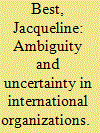

|
|
|
|
|
| Publication |
2012.
|
| Summary/Abstract |
How do international organizations deal with the persistent challenge of uncertainty? The most intuitive answer is through regulation. Yet, rules are not always the best solution in times of uncertainty or in dealing with complex and diverse problems. More ambiguous policies that leave room for interpretation, can often be more functional for an international organization (IO); moreover, ambiguities can also be a source of power-and are therefore often a subject of conflict among institutional actors. Focusing on the case of International Monetary Fund conditionality policy, this article provides several key insights into IO practices. It provides an account of the different forms that ambiguity can take in international organizations and develops an explanation for why institutional ambiguities appear and persist. Looking inside the IO black box, the study examines how interests, institutional culture, and legitimacy concerns shape actors' support for ambiguity, and how these preferences combine with broader structural factors to produce a predisposition toward institutional ambiguity. Finally, this article points toward certain implications of organizations' tendency toward ambiguity, suggesting that this may play an important role in enabling institutional expansion.
|
|
|
|
|
|
|
|
|
|
|
|
|
|
|
|
| 3 |
ID:
085598
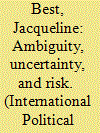

|
|
|
|
|
| Publication |
2008.
|
| Summary/Abstract |
In this paper, I argue that critical international theory could benefit from a broader and deeper conception of the limits of knowledge-that what is needed is more attention to the role of ambiguity in contemporary politics. While not challenging the usefulness of the more prevalent concepts of uncertainty and risk used by scholars applying the frameworks of global governmentality and world risk society, this essay proposes that we understand risk and uncertainty as two specific categories of indeterminacy that have come to preoccupy contemporary neoliberal thinkers and policy-makers, and hence their critics, but which nonetheless tend to downplay the interpretive dimensions of the limits of knowledge. Drawing on Michel Foucault's The Order of Things, as well as the ideas of John Maynard Keynes, I develop an analysis of the role of ambiguity in global governance-as an object of global governance, a tool to be exploited by it, and a limit to its operation. Concluding with the case of international financial governance, this essay suggests that not only will a focus on ambiguity shed light on the historical evolution of global finance, but it also provides us with some clues to the sources of the current subprime financial crisis.
|
|
|
|
|
|
|
|
|
|
|
|
|
|
|
|
| 4 |
ID:
053673
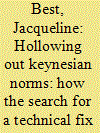

|
|
|
| 5 |
ID:
078980
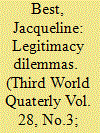

|
|
|
|
|
| Publication |
2007.
|
| Summary/Abstract |
There can be little doubt that the International Monetary Fund is currently facing a serious challenge to its legitimacy. Such criticisms echo similar debates that have surrounded other international organisations, including the World Bank, the United Nations and the World Trade Organization. As these different institutions seek to respond to this challenge, the Fund's efforts to respond to its critics provide a number of interesting lessons and warnings. In this article I examine the Fund's response to challenges to its legitimacy by focusing on one of the often overlooked aspects the institution's recent reforms: the IMF's efforts to change its relationship with borrowing countries by revising its conditionality guidelines and pursuing greater domestic 'ownership' over the reforms that it requires. While this response helps to resolve a number of legitimacy gaps that have emerged in the past decades, this strategy has also produced a number of new legitimacy dilemmas that raise questions about the sustainability of the IMF's current reform efforts. Chief among them is the limit to the Fund's ability to obtain the deeper political legitimacy that it seeks by using the same narrowly technical economic strategies that it has relied on in the past
|
|
|
|
|
|
|
|
|
|
|
|
|
|
|
|
| 6 |
ID:
176494
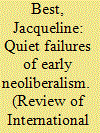

|
|
|
|
|
| Summary/Abstract |
While the last few decades of political economic history give the impression that the logic of neoliberalism is inexorable, this article argues that once we look further backwards and dig into recently declassified archives documenting the early days of neoliberal theory and practice, we find a messier picture. Economic policymakers in Thatcher and Reagan's administrations in the early 1980s did not set out to ‘fail forwards’ by generating a crisis that would enable a statist kind of neoliberalism. The key ideas that they drew on and the policies that they used to put them into practice sought to transform the economy indirectly, through a set of performative policy devices that they believed would generate a dramatic shift in people's inflationary expectations, lowering inflation without provoking a major recession. Archival records make it clear that these efforts were not only a failure, but also one that policymakers were acutely aware of at the time. By examining these quiet failures in economic policy, we can better understand how these governments simultaneously failed in their early efforts to introduce neoliberal economics and yet ultimately succeeded in transforming their economies in important respects – and in legitimising those transformations by narrating failure as a kind of inevitable success.
|
|
|
|
|
|
|
|
|
|
|
|
|
|
|
|
| 7 |
ID:
116900
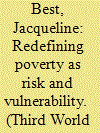

|
|
|
|
|
| Publication |
2013.
|
| Summary/Abstract |
The existence of global poverty poses a dilemma for liberal economic governance. Its persistence is an irritant to expert assertions that things will get better soon, making it necessary to develop new theories about the causes and nature of poverty and new strategies for managing and reducing it. This paper examines the most recent shift in how the World Bank and other organisations conceptualise and manage poverty, by beginning to view it through the lenses of social risk and vulnerability. The paper examines the evolution in how the Bank has historically sought to contend with the problem of poverty, and then considers the various expert debates and bureaucratic negotiations that shaped how this new conception of poverty as risk and vulnerability came to be institutionalised. Finally, I consider the implications of this shift for how the problem of poverty is governed, suggesting that it involves a much more dynamic ontology of poverty and requires the use of a more proactive set of techniques. While this more active intervention requires a more present and engaged state than was evident in the structural adjustment era, its role nonetheless remains constrained by the liberal preoccupation with limiting governmental power.
|
|
|
|
|
|
|
|
|
|
|
|
|
|
|
|
| 8 |
ID:
152742
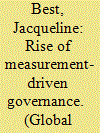

|
|
|
|
|
| Summary/Abstract |
Global governance is increasingly about measuring, ranking, and scoring. Focusing on the case of international development, this article suggests that we can learn a great deal about the recent changes in global dynamics by examining the rise of measurement-driven governance. The article engages with the recent scholarship on new governance, particularly the emerging literature on more experimentalist forms of governance. This study finds some evidence of a more experimentalist kind of governance in international development, but suggests that the specific technologies of measurement and accountability through which these new structures of decisionmaking are being facilitated are far from politically neutral. They are instead sources of considerable power that, in many instances, reinforce existing asymmetries and undermine the deliberative potential of these governance practices.
|
|
|
|
|
|
|
|
|
|
|
|
|
|
|
|
| 9 |
ID:
155810
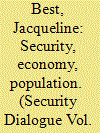

|
|
|
|
|
| Summary/Abstract |
In an era in which scholars have become increasingly skeptical about the concept of exceptionalism, this article argues that instead of rejecting it, we should rework it: moving beyond seeing it primarily as a security practice by recognizing the crucial role of political economic exceptionalism. Drawing on Foucault’s later lectures on security, population, and biopolitics, this article suggests that we can understand exceptionalist moves in both security and economic contexts as efforts to manage and secure a population. Focusing on three key moments in the production of exceptional politics – defining the limit of normal politics, suspending the norm, and putting the exception into practice – I examine the parallels, intersections, and tensions between political economic and security exceptionalism, using the concept of economic exceptionalism to make sense of the 2008 global financial crisis. Taking seriously Foucault’s insights into the political economic character of liberal government holds out the promise of providing scholars in the fields of both critical security studies and cultural political economy with a richer understanding of the complex dynamics of exceptionalist politics – a promise that is particularly valuable at the present political juncture.
|
|
|
|
|
|
|
|
|
|
|
|
|
|
|
|
| 10 |
ID:
163709
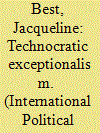

|
|
|
|
|
| Summary/Abstract |
What do border guards and central bankers have in common? Both operate, on a day-to-day basis, in political spaces exempt from many of the norms of liberal democratic politics and yet have the power to define and constrain them. In order to understand the role of such routine suspensions in the norms of liberal politics, we need to move beyond analyses that focus narrowly on security exceptionalism or emergency-management and pay attention to the practices of technocratic exceptionalism. Drawing on Foucault's lectures on biopolitics, I examine the ways in which economic theory and practice has sought to resolve some of the central tensions in liberalism by protecting the market from too much democracy—a kind of exceptionalism exemplified by the doctrine of central bank independence.
|
|
|
|
|
|
|
|
|
|
|
|
|
|
|
|
| 11 |
ID:
124431
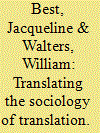

|
|
|
|
|
| Publication |
2013.
|
| Summary/Abstract |
Actor-network theory, material semiotics, the sociology of translation… The precise name of the domain in question is not itself entirely stable, and rightly so. In the ANT scheme of things, society is far less stable, representation and governance considerably more disputed, and order quite a bit more precarious, than most other frameworks would allow. Flux and impermanence are minor and tangled threads running throughout the history of the Western political imaginary: from Heraclitus and Lucretius to Nietzsche and Deleuze. No other research framework has married this minor current with empirical inquiry in a manner that is as thorough, practical, and relentlessly materialist as ANT. Bringing the Heraclitean worldview down to earth is one of its foremost accomplishments.
|
|
|
|
|
|
|
|
|
|
|
|
|
|
|
|
| 12 |
ID:
145113
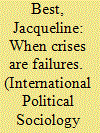

|
|
|
|
|
| Summary/Abstract |
What happens if we look at events like the 2007-2008 financial crisis not just as crises but also as failures? This shift is a productive one, opening up new ways of understanding the debates and policy responses that followed the recent crisis. For this was not just a crisis: it was also a spectacular failure. Moreover, it was a contested failure: the kind of failure that made key actors question the metrics through which they measured success and failure. Through a comparative analysis of recent failures in international development and international finance, this paper argues that looking at these crises as contested failures provides us with a better understanding of the epistemic underpinnings of certain crises and the politics of the responses to them. Focusing on failure also allows us to see that policymakers have become more preoccupied with the possibility of failure in the aftermath of these crises—and that they have become increasingly cautious in response. This paper concludes by exploring the implications of the increasing prevalence of “fail-safe” approaches to policy, a cautious approach to policymaking that may in fact increase the odds of future failures.
|
|
|
|
|
|
|
|
|
|
|
|
|
|
|
|
|
|
|
|
|